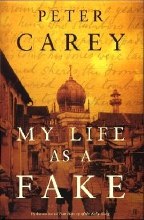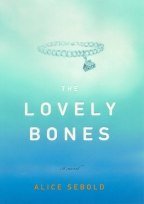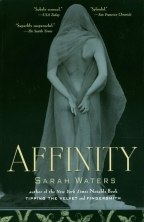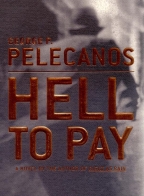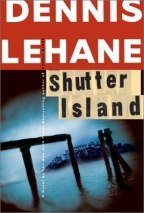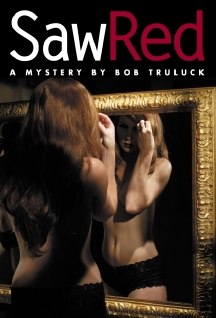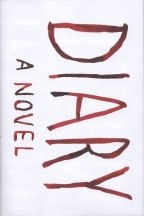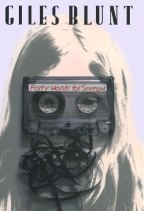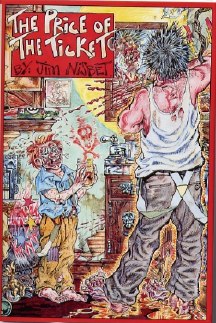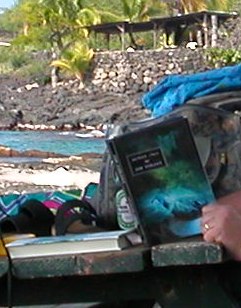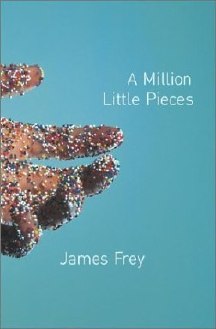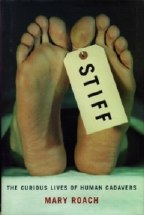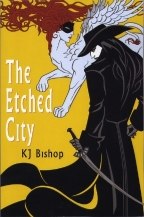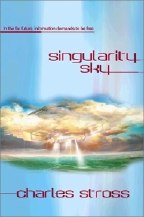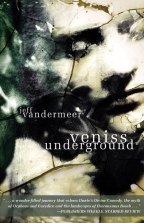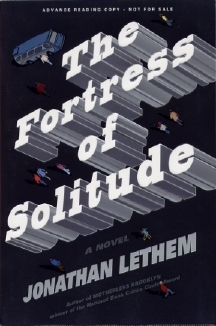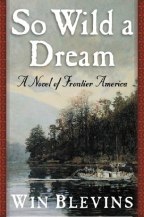Four
by More: An Agonizing Choice
Lots More
Than Ten Best Books from Last Year
The Agony Column for February
13, 2004
Commentary
by Rick Kleffel, Katie Dean Serena Trowbridge and Terry D'Auray
Yes, it took too
long. I know that, and I'll try to make moves to adjust for it. I'm
still trying to strike the balance between news
and columns, reviews and interviews. But what follows is not just
my work. It's the result of four reviewers who each spent their time
reading carefully and paying attention to every detail. I asked for "ten
best" lists and got a nice range, from Katie Dean's bare-bones
of classic literature to my own predictably bloated list. But I only
added one title to the ten, no fifteen no twenty, no twenty-one best
of last year.
We'll start this out simple, because, you know, simple is good. Simple
is clear. And Katie Dean is quite clear on what she liked from last
year. Here's what Katie had to say.
Katie
Dean
And
finally, my 10 best...it's quite a difficult thing to do. I've picked
books I've
read in 2003 rather than books published that year,
so, in no particular order, they are...
|
|
|
A
Faber and Faber favorite.
|
North and South - Elizabeth Gaskell
Dr Zhivago - Boris Pasternak
Treasure Island - Robert Louis Stevenson
Jekyll and Hyde - Robert Louis Stevenson
Women in Love - D H Lawrence
Frankenstein - Mary Shelley
The Lovely Bones - Alice Sebold
Northern Lights - Philip Pullman
My Life as a Fake - Peter Carey
Quite a range and it was impossible to rank them as they're all quite different, but they all have a few things in common - well written, compelling and left me with something to think about afterwards.
..........
And I hope this makes it clear that -- and why -- we manage to cover a wide range of material on this site.
Serena Trowbridge had a bit more to say about her favorites of last year. And she actually does what Terry D'Auray has accused me of wanting to do. Terry says that given the chance, I'll read Flannery O'Connor's 'Wise Blood' (and, I might add, Stanislaw Lem's 'A Perfect Vacuum') every year and use up spots on a ten-best with them. That said, Serena's choices are once again, perhaps, not what you'd expect from a website with "..chrome steel vanadium chains, ladies and Gentlemen -- he cannot escape these chains!" that bind it to the world of science fiction, fantasy and horror. And yes, I have seen 'King Kong' a few too many times.
Serena Trowbridge
Top ten books for 2003 (Not necessarily published this year! And not in any order as I just couldn’t manage that!)
|
|
|
| "Close to a masterpiece" |
In a year where some awful things have happened and everyone is scared to talk about them, this book stood out as unafraid, hopeful and a light in the darkness. I know it seems grisly, and that everyone is understandably afraid to let their children out of their sight, but this is close to a masterpiece.
Five Quarters of the Orange – Joanne Harris
I’ve read and loved all her books, but this was the one where the characters and story gripped me most. I couldn’t put it down. She recreates the historical France as well as contemporary places, and it’s absolutely enchanting. I love how she uses magic, but not in a deus ex machina way.
Defying Hitler/The Meaning of Hitler – Sebastian Haffner
There are things that have happened in history that we owe it to the world and our ancestors to understand. Turning a blind eye could lead to history repeating, but anyone who reads these immaculate, well researched but highly personal memoirs will understand that crimes against humanity cannot be tolerated in a civilised world.
The Little Friend – Donna Tartt
I was fascinated, appalled and scared throughout. Still not sure who did it though – answers on a postcard…it’s been driving me mad ever since.
I Capture the Castle – Dodie Smith
Actually this is my favourite book of every year, but I reread it as I was asked to do a reader’s guide to it to coincide with the release of the film. It’s teenage innocence and childhood cynicism; it’s also all the things I love about Britain and bizarre British humour, and I laugh and cry all the way through even after about 20 readings.
Tolkien – Michael White
All this fuss about Lord of the Rings – read the biog and see the real man. This is a fantastically well-written biography with lots of atmospheric colour, and is probably more readable than LOTR! Anyway, he lived in my road in Birmingham…!
King Lear – William Shakespeare
Had to reread this to teach it, but everyone should read it. Forget all the gothic books and dark films, this has madness, death, treachery, war and even a touch of incest. I “did” it at A-level and am still obsessed. A Thousand Acres of Sky by Jane Smiley gives an excellent contemporary take on it.
|
|
|
Plays with the reader.
|
Do characters in a novel have their own consciousness? Do we, as readers, really know how to draw the line between fact and fiction? The fact that this is discussed in a novel makes it delightfully post-modern, but bit’s a cracking yarn as well. Highly recommended!
Feminine Gospels – Carol Ann Duffy
Even if you don’t like poetry you should read this. This is narrative poetry at its best; Duffy is a master of a tale well told, and makes good use of internal structure in poetry. I loved it – it’s like listening to really good music played by a maestro, and that’s how poetry should be.
Affinity – Sarah Waters
This is a book that plays with the reader, and I do enjoy a bit of textual interactivity. I like things that are miserable and Victorian, so this was ideal for me anyway, but I especially liked the characters realness, and the way people believe what they want to – all the best books have characters that make you identify with them, and this was definitely one of those.
..........
Terry D'Auray couldn't quite confine herself to the usual "ten best" list, and we're all the better for it. She has a rather different take on the whole matter.
Terry D'Auray
Rather than allow indecisiveness to result in immobility at the task of judging entries for the “ten best” books I read in 2003 (or the “ten worst” for that matter), it’s far easier to simply identify the memorable books – exceptionally good, astonishingly bad, or just simply memorable – that made their way in front of my eyes during the year. And it’s also a reminder that I need to keep of a list of what I read, since my memory is becoming increasingly dangerous territory.
Certified Winners
|
|
|
| Gritty urban violence. |
Pelecanos’ newest book, ‘Hard Revolution’, will be released in January in a Dennis McMillan Limited Edition and in March by Little Brown. In addition to looking forward to that, I’ve also backtracked and picked up both ‘King Suckerman’ and ‘The Sweet Forever’ in pristine first editions for “the vault” of blue-chip books guaranteed to satisfy.
|
|
|
Pure,
tough prose.
|
I also relished the continuation of G.M. Ford’s compelling Frank Corso series, reading both ‘Black River’ and ‘Blind Eye’. Graduating from the lightweight Leo Waterman books of his earlier writing days to darker stuff, Ford’s Corso series is bleak, violent and rooted in the moral ambiguity of the times. Frank Corso remains a sad and mysterious protagonist, and his sidekick, Meg Dougherty is one of the best-written supporting characters in mystery fiction. With this well plotted, hyper real and highly witty series, Ford is proving himself to be a masterful writer of contemporary hardboiled fiction.
|
|
|
| Hey wait, who's doing the image choice here? |
Also high on the year’s reading list were Carol O’Connell’s ‘Crime School’, who’s original and ballsy protagonist Mallory never fails to satisfy; Bill Pronzini, who thankfully put to rest the rumors of the demise of "Nameless”, his long-standing detective series protagonist, with the wonderful ‘Spook’; and Laurie King’s stand-alone ‘Folly’, a rewarding story of self discovery and mystery. In the offbeat-romp category, nothing can hold a candle to Marius Brill’s over-the-top ‘Making Love’ for unbridled imagination, prose that is both witty and literary, and a plot that veers from wild to wilder.
Late to the Party
|
|
|
A
bit of the gruesome.
|
As a result of my sensitive hype-meter, I like to think I’ve spared myself some real horrors. On the other hand, I’ve also missed some appealing gems, one horror-writer in particular, Chuck Palahniuk. While Palahniuk is frequently described as the “reinventer” of horror, his 2003 novel ‘Diary’ was labeled “mainstream”, and if I’m going to read a horror writer, better mainstream than avant-garde. ‘Diary’ turned out to be a delight, easily one of the best books I read in 2003. The plot, while horrifically bizarre and singularly twisted, was accessible to a mystery fan who savors realism and a bit of the gruesome. And the language was simply sublime, scathingly cynical, acerbic and muscularly lean, like many of the best hyper-modern mystery writers. While still leery of the horror genre, Palahniuk’s previous books now go in the sure-to-be read vault as an antidote of originality to my normal hardboiled mystery fare.
I also finally read my first Lew Griffin novel by James Sallis, a prolific and well-regarded mystery writer who often appears in the must read lists of other well-regarded mystery writers. Beginning with the first Griffin, ‘The Long-Legged Fly’, followed shortly thereafter by ‘Bluebottle’, Sallis’ stories, seeped in New Orleans atmosphere and history, are social commentaries on race, economics and the quest for peace and human connection in an unkind, often unjust, world. Griffin is a black detective in a white world; he travels with prostitutes, gangsters and petty crooks, and he is angry, isolated, bereft, and utterly and engagingly human. Less mystery stories than character stories, Sallis writes with a poetic grace that’s rare in the genre. His prose is undeniably original, richly textured, soulful and poignant. It’s nothing but good news that he has written many Griffin novels, so I can blissfully play catch-up for some time to come.
Fabulous Firsts
The year 2003 was a winner for debut mysteries, with exceptional first novels from Mark Haddon, Giles Blunt, Adrian McKinty and David Corbett.
Mark Haddon’s ‘the curious incident of the dog in the night’ is an engagingly original novel of an autistic teen’s inner and outer demons. While setting out to discover who killed a neighbor’s dog, autistic Christopher Boone instead uncovers the causes of the break up of his family and the terrors and joys of an unfathomable world. Written from the perspective of its teenage protagonist, ‘curious incident’ is a story told straightforwardly and without emotion that manages to generate remarkable resonance and human connectivity. Smoothly blending humor, originality and compassion, “curious incident” is an exceptional debut novel.
|
|
|
An
intriguing, icy chill.
|
‘Dead I Well May Be’ is Adrian McKintey’s debut novel of the unlucky Michael Forsythe, newly arrived in the US from Ireland, and caught up in a world of petty and violent crime in the US and Mexico. Mixing gangsters and drug lords with typical underworld actions and totally atypical prison segments, McKinty’s novel is a masterful story of betrayal and revenge written with a sure hand in tough, highly readable prose. It wins my kudos for a gritty and original narrative.
Unquestionably my favorite debut novel of the year is David Corbett’s ‘The Devil’s Redhead’. In a poignant love story and a tough and violent exposition of rivaling ethnic drug lords in Northern California, Corbett marries lost innocence and contemporary brutality with grace, sensitivity and some of the most memorable prose of the year. Corbett's characters mix action with self-reflection, violence with soul-searching, to bare their psyches along with their fates. This is an emotional novel, both beautiful and depressing - a haunting, unforgettable reading experience. His second novel, ‘Done for a Dime’, even more acclaimed, beckons.
Certified Losers
As I become more selective and well informed about what I choose to read, big misses become increasingly rare. But this year, there were a couple of true standouts. The first, Chris Simms’ ‘Between the White Lines’, was billed as doing for driving what ‘Psycho’ did for showers. Well, not by a long shot! With plotting that stretched the credibility of one who’s credibility was willing to be stretched, and prose that was heavy-handed and hollow, ‘Between the White Lines’ utterly failed to deliver on its promised scariness and turned into a true laugher. It’s out of here – no room on the bookshelves for this.
Equally unsatisfying was Ben Rehder’s debut novel ‘Buck Fever’. Ostensibly a Texas caper novel featuring game warden John Marlin and a cast of characters who stand out only for the quantities of beer they can guzzle, ‘Buck Fever’ is a Charles-Willeford-gone-wrong story of Texas-sized hicks wrecking Texas-sized havoc. In prose that is simplistic and clunky, the story lurched along without charm, without humor and utterly without appeal. Rehder, of course, has written a sequel, which won’t be finding its way to my house.
And finally, a book so not-to-my taste that I couldn’t finish it, ‘Latex Monkey with Banana’ by Jonathan Worlde. Intrigued by the title, which is undeniably wonderful, I found myself in the world of a Puerto Rican musician on the trail of a serial killer who marks each death with a latex monkey figurine sporting a three-inch penis in one hand and a three-inch banana in the other. Oh please! This description is sure to whet the appetite of any number of readers, who will now set out to track down this little gem on their own.
Newfound Guilty Pleasures
|
|
|
Dennis
McMillan goes where no others dare!
|
And finally, a book that only I seemed to like – Jim Nisbet’s ‘The Price of a Ticket’, a messy, way too wordy and almost literally unreadable book that is also hysterically funny, utterly bizarre, totally absurd and, these many months later, still memorable. I’m glad I stuck with it ‘till the end, because it seems to have found a way to stick with me.
..........
And finally my list.
Rick Kleffel
Like many reviewers, I keep careful track of the books I read and review, in part because somewhere along the line, I know I'll want to make an annual list of my favorites. I found myself not just thinking which books I liked the best, but rather, how my feelings towards the books I had read last year -- and in previous years -- had changed. Since I pick nearly all the books I read for myself, I read books that I like. Finishing any book, I tend to have enjoyed it at one level or another. But those positive feelings change as time goes by. It's not that I feel less positive about any given book. It's more that I feel less about a given book.
|
|
|
A
reading vacation.
|
It's impossible to ignore what other people thought of a book. This can have both positive and negative consequences for your long-term enjoyment of the work. If you read a book and have a muted reaction to it, then find that it's being lionized left and right, it's tough not to go back and revise your impression. The reverse can also be true; if you love a book that's generally despised, it might lose its lustre. And of course, both of these effects can be reversed if you're of a contrary nature. I'm of a contrary nature. It also depends on who is doing the talking. Some readers might be more influenced by what their friends thought, while others might be more influenced by what the critics thought. The critics have their biggest effect in getting you to read a book. But even afterwards, a good critic might make you think twice about your own opinion. You may not revise or even adjust it, but you'll certainly engage in a mental debate with the critic. In general, what others think about a book doesn't have that much sway over what we think of a book, but it does factor in over the fullness of time.
In 2003, I read 84 books. Once again, I've posted my annual reading list in spreadsheet form so that you can enjoy it in all its gory detail. Since I've reviewed every single book I've read, there should be no surprises. Alas, and I've lamented over this often in columns over the years, I'm a slow reader. Part of this is because I have a lot of irons in the fire; my time is limited. Part of this is because I have an unconscionable interest in watching television, about which I refuse say more. And part of this is because I often deliberately diffuse the reading experience, so that I can soak up the ambience of what I'm reading. In the first pass of the ten best books, I only managed to winnow down the field to 21 -- no make that 22 with a last minute pull-in. That will have to do.
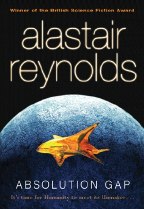 |
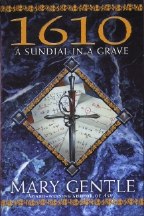 |
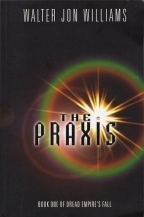 |
|
These books all came out in 2003, but I won't get to read them till this year. |
||
In addition, there are a number of books I didn't read last year for one reason or another -- usually involving scheduling around interviews or reviews. Those books are nearly as important as the ones I did read. This would include Alastair Reynolds 'Absolution Gap', Mary Gentle's '1610', Neal Stephenson's 'Quicksilver', George P. Pelecanos' 'Soul Circus', Walter Jon Williams' 'The Praxis', Dan Simmons' 'Ilium', and Jasper Fforde's 'The Well of Lost Plots'. These just came off the top of myhead; there are an equal number that will occur to me as the days pass.
The list should probably be topped off with Graham Joyce's 'The Facts of Life', a 2002 novel that, like those above, wasn't read read until 2003, offset by a year. This novel is everything a great novel should be. It's bursting with life, with joy and strangeness and sorrow and death. The characters that comprise the complex and yet crystal clear matriarchy at the center of the novel come crisply to life in Joyce's sparse prose. For all the time that's covered, for all the emotional distance that Joyce takes you, this is a remarkly slim, yet fulfilling novel. In a sense it's OK to put it in this year's list; the prescient and always tasteful Gollanz brought it out late in 2002, but it saw an American debut in 2003. Joyce is a thrillingly original novelist with a human vision like no other.
|
|
|
| A gripping and memorable memoir. |
At first I was working on a long list elucidating the wonderful properties of each book in my list. Then, I got bored doing that, which suggested you might get bored reading it. So instead, I went and ruthlessly ordered my book in a totally unfair and often inaccurate list from one to twenty-one. Make that twenty-two. I think, unless I added yet another.
I have to say that it was a great year for first books. James Frey, Cory Doctorow, Mary Roach, Kirsten J. Bishop -- each of them turned in an outstanding work the first time out of the gate. Doctorow's 'Down and Out in the Magic Kingdom' was wise and funny, bubbling with ideas. When I read it, it felt a bit on the light side, even though it was clearly smart as hell. In retrospect, it seems not in the least bit light. Time has brought out the complexity in my mind. I can go back and visit Doctorow's complicated world and enjoy all the subtle nuances he brought to a work of science fiction that was on the surface -- and what a surface -- just a hell of a lot of fun. James Frey's 'A Million Little Pieces', a non-fiction rehab memoir seemed rather off-putting at first; thick, tiny type and oddly punctuated. I have to admit that the cover image made me snatch it off the table for the Fine Print crew more than the subject did. But once I cracked the code, it turned into a gripping noirish thriller about the rebel of the rehab unit. This one, over time, acquired a depth and subtlety that wasn't apparent when I was reading it the first time around. And the characters have taken on a life of their own; well, I guess they already had one, but now I'm waiting anxiously to find out what will happen next, and the author has promised we will find out.
|
|
|
|
Bishop writes what is clearly, recognizably fantasy, yet she invests it with an original vision that's both striking and poignant. Striking we pretty much expect in a fantasy, poignant is a lot rarer. Her characters and her world are finely written in a way that sticks with the reader and grows. I can still feel the spaces between the words, between the cities in Bishop's world. And her battle scenes, smaller in scale, shorter in length, stand out more than the epics we've seen onscreen and on the page. There's a distinctly personal feel to Bishop's work that hangs on long after the book is closed.
|
|
|
| Rattling with ideas. |
|
|
|
Veniss
Prime.
|
Now Mark Haddon's 'the curious incident of the dog in the night time' isn't his first novel, either. But it's his first adult novel, so like Vandermeer's work that puts it in a sort of netherworld of first-not-first. But this I know for sure. Haddon's novel was hands-down, without doubt, the most loanable, the most recommendable, the most deserving of number-one bestsellerdom of last year. They could drop it from helicopters with a bill attached and I bet nine out of ten people would read the book and pay the bill, happily. And they'd probably try force it on the one in ten who didn't want to read it. Haddon work is the kind of thing you can't do in movies, though some enterprising soul may just go right out and make a bang-up movie of it. But it works as a book in the ways only books can work. It gets right to you and sears your soul with the joy and pain of the narrator's quest. Look, ignore everything else I've ever said, but read this book, and I think you'll agree that it's something special.
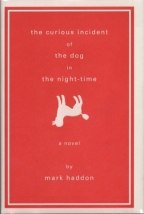 |
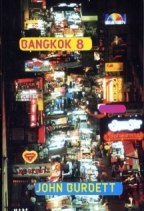 |
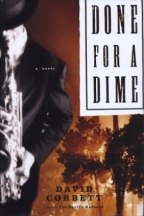 |
|
Inventive writers and evocative prose from 2003's top novels. |
||
John Burdett's novel 'Bangkok 8' was not his first novel. But it was the first I encountered at Bookshop Santa Cruz, and it knocked me right out, it did. Like Haddon's novel, this book turns largely on the point of view of the first person narrator. In this case, it is not a disease that defines the perspective, but a religion. It reads in many ways, like a science fiction novel, offering a point-of-view that allows clueless Western civilization to see itself entirely from the outside. Even now, I can return to that perspective, look at myself from Sonchai's eyes.
David Corbett's mystery novel 'Done for a Dime' isn't a first novel either; it's a second novel that reads like the complex achievement of a long and award-studded career. In retrospect, it feels like the mature work of a classic mystery writer. The thrill is that we can get to see where Corbett, already an assured pro goes next; to see how he grows beyond what we currently know as the seasoned professional.
Like any reader, I appreciate my share of fun reading. And lots of what I read last year was fun, but the fun that stuck with me came in the guide of two excellent science fiction novels; Neal Asher's 'The Line of Polity' and Richard Morgan's 'Broken Angels'. Look, like just about any guy, I'm kind of a dope for guns and monsters, and these guys both brought me guns, monsters and another ingredient not often found in the vicinity of guns and monsters -- characters I cared about. Asher's mutant kid Apis Coolant is just too wonderful, while Morgan's Takeshi Kovacs is too cool. Chuck Palahniuk's 'Diary' offered that sense of fun as well, in a literary package that showcased writing skills rarely brought to novels that are as much fun to read. Period, and that's all I need.
|
|
|
The
Great American Novel of 2003.
|
I'll go back again and again to visit Phil Rickman's Merrily Watkins. It's a numinous mystery series with characters like old friends, mysteries that unravel and illuminate, an atmosphere I can breathe easily, gracefully, thankfully. I don't read much series mystery. But in novels like 'The Lamp of the Wicked', Rickman's blend of mystery, character and the supernatural is the kind of comfort that I cannot do without. The same would be true of another series author I just discovered this year, yet I read enough of his work to make my choice of which was best difficult. While the rest of the world has been reading Terry Pratchett like gangbusters, I've always managed to resist the urge. Having started reading him, I now look back and wonder what the hell I was thinking. Pratchett's novels definitely do not fade with time; they get better in memory. Pratchett's latest novel, 'Monstrous Regiment' is a beautifully written political satire, but coming as I did, from never having read any of Pratchett's Discworld novels, I was most captivated this year by 'Night Watch', a poignant tale of policing in Pratchett's remarkably complex creation. Jon Courtenay Grimwood's 'Felaheen' was another creation that blended intense imagination and emotion more effectively than anyone has a right to demand. The density of Grimwood's world is beyond compare in today's speculative fiction. Behind every word, one can sense a world as real as ours, as complicated and terrifying human, yet a world that is nothing like ours --other than it is the result of humanity living a life unfettered by reality as we, at least, know it. We'll have to thank Del Rey here in the USA when the novels start appearing next year. Look for them to win awards in either the mystery genre or the science fiction genre, or most properly, in the plain old fiction genre, though they are nothing like plain or old.
|
|
|
| A lovely, memorable novel. |
Ian R. Macelod's 'The Light Ages' marks the start of a beautiful, detailed series set in a Dickensian England which has been tweaked by the discovery of a magical source of power. Prose is Macleod's magical source of power, paired with a scientific extrapolative rigor and a connection to the deepest well of our emotions. It makes a nice pair with Ken Macleod's 'Engine City', a space opera series capper that makes horrifically depressing conclusions about mankind far more fun than they deserve to be. Together they create an iron dream which will trap the hardiest readers between bars of hopelessness and despair.
And in contrast to the serial works we know and love, there are the authors we can count on to produce standalone novels of power, grace, humor, wonder --it's a wide palette. Last night, I was flipping past a Discovery channel show on whales, and when they stated that the fluke of a whale was as individual as a human fingerprint, I flashed on Christopher Moore's wonderful novel of the same title, 'Fluke'. Moore lavishes as much attention to his wonderful characters as he does to a thrillingly mind-boggling premise in 'Fluke'. This is the good-time novel you can go back and re-read to re-laugh at the jokes. There's also a lot of humor in Chuck Palahniuk's remarkable 'Diary', the kind of black humor you'd expect from the author who brought you last year's 'Lullaby' and the mordant satire 'Survivor'. Palahniuk gooses his story of supernatural revenge with writing so stripped down, so transparent and yet so skillfully complex that it's hard to believe the prose structure that unfolds in your reading mind. Stewart O'Nan shows a similar level of skill in 'The Night Country'. O'Nan also deploys a storyteller's voice to unfurl the Halloween tale of a tragic auto accident with surprising causes and reverberations that ripple reality. Typing these words about the book, the sky begins to darken, and I can feel the leaves turn; and that's what I want from a novel, something to hold on to, something to go back to.
For me, looking back at the books I read last year, I can see where I was and what I was doing as I read them. While I read books with bookmarks, books themselves become a form of life marks, icons which I can grab on to, to bring back a memory good or bad, of what was happening when I read them. This is at least one reason why I keep track of what books I read and when; of course my writing for this website is clearly another. But I can look at last year, from the goofy, post-NewYears' fun of Cory Doctorow's 'Down and Out in the Magic Kingdom' to the warm summer nights of reading Jonathan Lethem's 'The Fortress of Solitude'. From a radiant spring day with Graham Joyce's 'The Facts of Life' to a long Fall holiday drive immersed in 'So Wild a Dream'. Each book another notch in the year, another experiential overlay on life itself. Last year is gone, but the books remain.
